The Optimist’s Telescope: Thinking Ahead in a Reckless Age
Air Date: Week of March 27, 2020
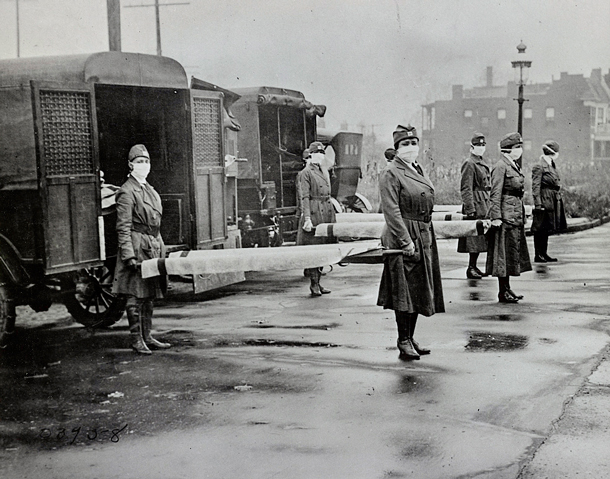
Women of the St. Louis Red Cross Motor Corps carrying stretchers during the 1918 influenza pandemic. The city of St. Louis had a quick and effective response to the pandemic and was able to significantly lower potential death compared to other cities throughout the United States. (Photo: GPA, Flickr, CC BY NC 2.0)
Making decisions today based on what may be best for tomorrow or even years ahead is far from easy. The current moment is highlighting the perils of not planning ahead for challenges such as pandemics, or climate disruption. Bina Venkataraman, author of The Optimist's Telescope: Thinking Ahead in a Reckless Age, joins Host Steve Curwood to talk about how we can tackle shortsightedness in our personal lives and in society, to plan better for the future.
Transcript
CURWOOD: It’s Living on Earth, I’m Steve Curwood.
Making decisions today based on what may be best for tomorrow or even years ahead is far from easy, especially when there are immediate costs. Addressing climate change is one example, as it can reduce short-term profits and increase expenses for many businesses, even as it boosts long-term prospects. And we are all too aware how budget cuts in US public health services and a lack of planning for pandemics landed us in the throes of the current coronavirus crisis. But in her new book, The Optimist's Telescope, thinking ahead in a Reckless Age, journalist Bina Venkataram writes there are ways to tap higher levels of thinking that can lead to actions for better futures. Bina Venkataraman is a former climate advisor for the Obama Administration and Editorial Page editor for the Boston Globe and she joins me now. Bina Venkataraman, welcome to Living on Earth!
VENKATARAMAN: Thanks so much for having me, Steve. I'm glad to be here.
CURWOOD: So we're in the midst of a novel coronavirus pandemic, what parallels, if any, do you see between people's inability to look over the horizon at the implications of climate change climate disruption, and the implications of a possible pandemic?
VENKATARAMAN: There's a lot to learn here. There's a lot of parallels. So the optimist telescope was really my attempt to write down a collection of insights about how we can think ahead better and some of the insights, you know, the opposite has been sort of what has happened. And if you look at it from the United States point of view, you know, in late January, when we had our first case appear in the US, you had leaders or our president in the White House, saying this was not a big deal that this is all going to go away and be fine, that the risk is low. You even had an attempt to sort of not count the cases. He was hoping to keep the number lower, he somehow thought if he left some cruise ship passengers out at sea, that that would keep the numbers lower in terms of Americans who'd be diagnosed with this. Well, you know, if you don't count them, it still becomes a problem down the road. So quite a bit of short-sighted thinking. If you think about it, from the point of view of society, I think a lot of us have been reluctant to recognize this threat coming over the horizon. And one of the insights from the Optimist's Telescope about why that happens, you know, we fail to prepare for what we can't easily imagine or what we haven't already experienced. So for a lot of people having an epidemic of this kind of scale and proportion, where it's this contagious, and this potentially deadly is not something that they remember in their lifetime. But a lot of the actions that are needed to prevent the spread of a virus like this have to be taken at an early enough stage to be effective. So if you can aid people's imagination and help them really take these things, threats of the future seriously, then you can do a lot better. And I'll tell you one thing that's really interesting in this case for the United States is that we can look to what's been happening in Italy because we're days behind Italy's trajectory in this epidemic.
CURWOOD: So a while back, we spoke to a physician, Jonathan quick. He's been with the World Health Organization, he teaches at Duke now. And he pointed out that back in 1918, at the great flu pandemic, they call it the Spanish flu, even though it really was all over the place. There was a public health officer in St. Louis, Missouri, who organized people. And Dr. Quick says that the death rate in St. Louis was about a quarter of the death rate in other big cities, some of the other big cities, simply because this fellow got out and really got people organized. got everybody aboard, because he was looking over the horizon of what could happen. Dr. Quick also pointed out that we have about 45,000 fewer public health workers than we had some time back before the other economic meltdown, we're most familiar with the one back in 2007, 2008. In other words, those people were let go because there was not seem to have an immediate need for them. We overlook decisions that really will contribute to our well being, like, you know, skipping a workout or procrastinating our responsibilities or like having a full-throated public health service available for when trouble comes. Why do we have so much trouble looking ahead?
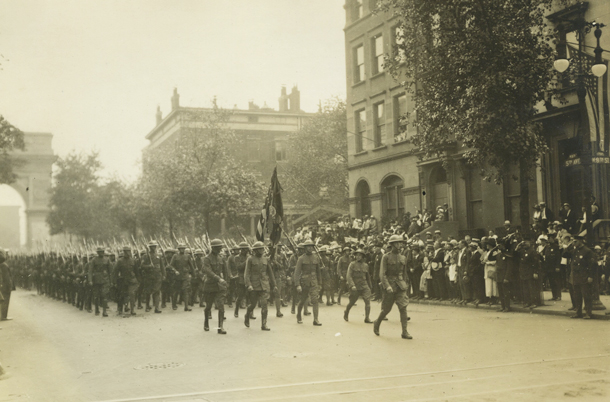
A 1919 World War I Victory Parade brought people together even though the Spanish flu was still a pressing danger. (Photo: USMC, George Barnett Collection, Flickr, CC BY 2.0)
VENKATARAMAN: Well, if you think about it, the future doesn't really exist. yet. The future is not something we perceive with our senses. We don't smell it, we don't taste it. We don't see it right in front of us. So we conjure it with our minds, it's a figment of our imaginations. And the fact that human beings can do this is actually somewhat miraculous. We may be the only creature that can do this. It's not confirmed yet. But we do have this capacity to sort of dream up what the future could look like we use our past experiences to project ourselves into future scenarios, what's known as episodic memory, but it's an imperfect skill. So we have to really stretch ourselves when we're talking about unprecedented change, unprecedented scenarios, things we don't have in our memory. But it's interesting that people are talking so much about the 1918 influenza epidemic because that does provide us a way to try to imagine the scenario and the people who've studied that history, I think in some ways are those who have been able to give the right kinds of warnings to prepare for what's been happening around this novel coronavirus pandemic. And one of those insights, for example, is that gatherings large gatherings like the World War I victory parades that were happening in cities like Philadelphia and Boston in 1918 turned out to be accelerators. They turn out to be pivotal events that spread the disease to more people. So some of what we can use to conjure the future comes from not just our own experiences, but the experiences of other human beings which get carried forward by stories by keeping the past very much alive in our imaginations. And one of the stories I tell in the Optimist's Telescope to this point is about the engineer who was responsible for designing the nuclear power plant in Okinawa, Japan. Now Okinawa, for those who don't know, was closer to the epicenter of the 2011 Tohoku earthquake and tsunami than the infamous Fukushima Daiichi which we know the disaster that happened there when the reactors melted down. And that happened because the tsunamis breached the seawall there in Fukushima and flooded the reactors now. In Okinawa, the nuclear power station was a place of refuge for people in the town during the 2011 earthquake and tsunami. And the reason for that is a man named Yanosuke Hirai, this engineer I described to you had insisted that it'd be built farther back from the coast and at a higher elevation with a higher seawall. And you might wonder why well, he knew the history of his hometown shrine, which in the year 869, had flooded due to the Jogann earthquake and tsunamis that followed that. So this is very much an important insight about what it takes to think ahead, what makes it easier or what empowers certain leaders to be better able to imagine a future on behalf of the rest of us and prepare us for what's to come and keeping the past alive is very much one tool we need to keep in our tool belts.
CURWOOD: By the way, you pointed out during the 1918, 1919 flu pandemic. One of the events a couple of the events are really set off the contagion were these rallies that were held around World War I. But the point of those rallies, the government was trying to raise money for bonds to pay for the war. In other words, there was economic interest in bringing people together at the same time, which makes maybe the public health interests would have been to keep them apart. What parallels, if any, do you see today from that kind of thinking?
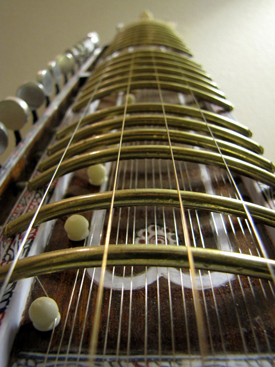
The Dilruba is an ancient North Indian instrument which grew to become a family heirloom for Bina Venkataraman. In the book The Optimist’s Telescope Bina highlights ways of taking care of our earth and our natural resources by viewing them as family heirlooms. (Photo: Kasleen Kaur, Flickr, CC BY SA 2.0)
VENKATARAMAN: I certainly see some parallels. So there's a hardship to small businesses to large businesses. When you decide to tell people to stay indoors, for example, and socially distance themselves, they're not going to go out and patronize the restaurants and bars and other places they normally would. There's an economic impact on canceling large events like the Boston Marathon, which was canceled this year or other events all around the world that had been canceled as a result of this outbreak. But we know also that acting early flattens the curve as epidemiologists like to say. Which is to say that at the peak of the epidemic, you're going to have less of a burden on healthcare systems and hospitals, you're going to have fewer deaths, you're going to have a faster recovery or return to normal if you spend Some of that burden on the system. Now, that requires some short term sacrifice to the economy at times, but what you're really doing is preventing damage to the economy over the long run. By reducing that health burden, it's hard to make decisions like that, because our politicians, our business leaders are often not rewarded for making the decision that turns out better in the long run.
CURWOOD: So let's talk about culture and thinking ahead. In particular, I'm wondering about Wall Street, which often focuses on the next quarter, compared to people who will erect cathedrals and it might be hundreds of years before the project as originally envisioned, finally, has the last stone put in place.
VENKATARAMAN: Yes, so you can contrast those cultures and really see a difference. And the question I wanted to ask IN writing the Optimist's Telescope was how do you bring some of the thinking of those cathedral builders into the context of very short term oriented cultures like an investment, like walls street it possible to do that? And one investment firm in particular that I write about in the book is Eagle Capital, which is based in New York and this firm, in particular, will look at milestones instead of near term metrics. So what is a company doing that is building its share of the market? What is a company doing that's increasing customer loyalty, and you can measure these things in different ways. They also just kind of try to map out scenarios for their investments. So they'll think a few years into the future 5, 10 years into the future and say, Okay, let's imagine the investment has failed, that this was a terrible investment. Let's ask ourselves why and how that happened, sort of in advance. This is a technique that Deborah Mitchell who was formerly at Wharton, called prospective hindsight, which is to say to project yourself into a future scenario as if it's already happened. And then ask yourself the why questions and how questions and that can help illuminate the decisions. We have Today that can influence those future outcomes.
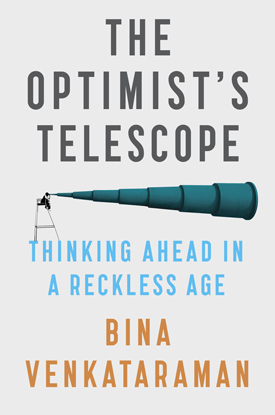
In the Optimist’s Telescope Bina Venkataraman looks at mitigating losses caused by shortsightedness. (Photo: Courtesy of Bina Venkataraman)
CURWOOD: So how can we get to a better place thinking about the future, the way that we are compromising the habitat of this planet, whether it's with climate change or loss of species and such.
VENKATARAMAN: Well one interesting way of thinking about ourselves when it comes to the future that I really came to believe in, as I was writing this book, is to stop thinking of ourselves as sort of existing in our one chapter in time to rather think of ourselves more like ancestors. And when I was writing this book, I came across fishing communities in the Pacific coast of Mexico who is treating their lobster fishery in a way that I would say is kind of like a shared heirloom where they're trying to protect that lobster fishery overtime to pass to their sons and grandsons to continue fishing there. And, you know, there are other fisheries that are doing things like this that they may not consider to be thinking like ancestors or keeping heirlooms, but in practice kind of look like that. So there's a system being used known as cat shares for fisheries where the fisherman instead of just fishing as much as they can to get as much as they can possibly get out of a fishery, in the short run, become long term investors, and they have a share of that fishery, which grows over time if the fishery rebounds. So they have a motivation to bring back those fish populations so that their share can grow over time. And that's worked well with the commercial red snapper fishery for example, in the Gulf of Mexico that's run out of Galveston, Texas. So I found examples of places around the world communities where people are treating our natural resources, much more like shared heirlooms. And the question is, how do you do that? Well, you need rules you need either informal rules between communities that will establish what's worth taking now what's okay to take now, that will still leave, if you will, a sort of principle for the future, if you want to think of it as a fund, you want to still leave some capital in the fund and take off only what your generation should in terms of the interest from that fund, what should be used today. But when generations use and make meaning out of that heirloom, they in a way, become part of protecting it, and they adapt it and use it over time.
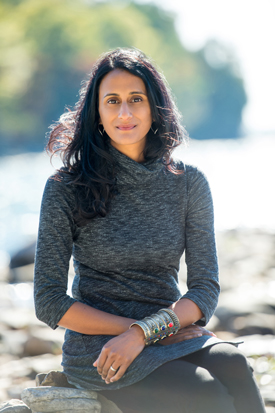
Bina Venkataraman served as Climate Change Innovation Advisor for the Obama White House and is the Editorial Page Editor for the Boston Globe. (Photo: Courtesy of Bina Venkataraman)
CURWOOD: I imagine a number of people listening to us are very concerned about the climate. Listeners, typically to living on earth have strong opinions one way or the other about it. And yet, I'm guessing that among the people who are listening to us that a significant number won't go to the polls and vote. Why do people have trouble thinking about the future when it comes time to get up and vote in ways that would help causes that they think are important?
VENKATARAMAN: Well, I hope this year, we're going to see a lot more people voting based on their concern from climate change. And actually, at the globe, we solicited questions when we interviewed Democratic presidential candidates. And I have to say that our readers seem to be very concerned about climate change, especially I think young voters, young people are really asking the question of what are the plans that our presidential candidates or our gubernatorial candidates have on climate change. Now, I think there's a reason that people can feel sort of powerless when it comes to climate change and part of it is that a lot of the way we talk about climate change a lot of the way the conversation in the media has been about climate change. So I'll take some responsibility for this, has been to paint sort of versions of the future that look pretty dismal. I think it's really important that we be very open-eyed about the threats that we face from a changing climate, but it's also important I think, for people to be able to imagine What does it look like if we can actually solve this problem? Is there a positive alternate version of the future that they can embrace that they can get behind so that they're not just voting against something when they go to vote about climate change, but they're voting for something. But I also think when people go to vote, whether they're young or old, wherever they live in the country, it's easy to let their present concerns dominate how they're going to vote. And I would say some of the tools and the Optimist's Telescope for projecting oneself in the future, whether that's writing a letter to your future grandchild, or child or niece or nephew, and just saying, what is the world that you want them to inhabit? Can you paint a picture of that world? I would love if everyone in the country just were focused on that next generation before they go to vote in November, for example, I think it could really change things. Because we are too often so focused on whatever that immediate need is and the way that politics works, the way that policy works, it's often the case that the impact Anyone election is going to be felt for generations.
CURWOOD Bina Venkataraman's new book is called The Optimist's Telescope: Thinking Ahead in a Reckless Age. Thank you so much for taking the time with us today.
VENKATARAMAN: Thank you so much, Steve.
Links
Learn more about the author Bina Venkataraman
Click here to read an excerpt of The Optimist’s Telescope: Thinking Ahead in a Reckless Age
Learn more about social distancing in the 1918-1919 flu pandemic
Living on Earth wants to hear from you!
Living on Earth
62 Calef Highway, Suite 212
Lee, NH 03861
Telephone: 617-287-4121
E-mail: comments@loe.org
Newsletter [Click here]
Donate to Living on Earth!
Living on Earth is an independent media program and relies entirely on contributions from listeners and institutions supporting public service. Please donate now to preserve an independent environmental voice.
NewsletterLiving on Earth offers a weekly delivery of the show's rundown to your mailbox. Sign up for our newsletter today!
 Sailors For The Sea: Be the change you want to sea.
Sailors For The Sea: Be the change you want to sea.
 The Grantham Foundation for the Protection of the Environment: Committed to protecting and improving the health of the global environment.
The Grantham Foundation for the Protection of the Environment: Committed to protecting and improving the health of the global environment.
 Contribute to Living on Earth and receive, as our gift to you, an archival print of one of Mark Seth Lender's extraordinary wildlife photographs. Follow the link to see Mark's current collection of photographs.
Contribute to Living on Earth and receive, as our gift to you, an archival print of one of Mark Seth Lender's extraordinary wildlife photographs. Follow the link to see Mark's current collection of photographs.
 Buy a signed copy of Mark Seth Lender's book Smeagull the Seagull & support Living on Earth
Buy a signed copy of Mark Seth Lender's book Smeagull the Seagull & support Living on Earth

